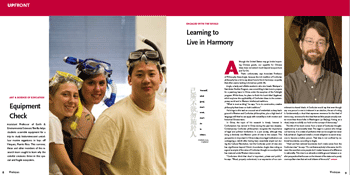Engaged With The World
 Although the United States may go broke importing Chinese goods, our appetite for Chinese ideas does not extend much beyond acupuncture and Tai Chi.
Although the United States may go broke importing Chinese goods, our appetite for Chinese ideas does not extend much beyond acupuncture and Tai Chi.
That’s unfortunate, says Associate Professor of Philosophy Steve Angle, because the rich tradition of Confucian philosophy has a lot to say about how to live in harmony?a quality that often seems lacking in American public life.
Angle, a lanky and affable academic who also heads Wesleyan’s East Asian Studies Program, was scrambling in late June to prepare for a yearlong leave in China under the auspices of the Fulbright program. While there, he plans to finish his book titled Sagehood, which explores the applicability of Confucian ideas to the contemporary world and to Western intellectual traditions.
“What is most exciting,” he says, “is to do constructive, creative philosophy that draws on both traditions.”
He brings to this task an unusual set of credentials: a deep background in Western and Confucian philosophies, plus a high level of language skill that he can apply with versatility to both modern and historical Chinese texts.
In China, the topic of his research is timely. Interest in Confucianism has revived in China during the past two decades. Contemporary Confucian philosophers recognize the importance of legal and political institutions in a just society, although they bring a distinctly non-Western point of view to the subject. This perspective is important in China today since legal institutions are undergoing a rebirth after having been essentially wiped out during the Cultural Revolution, but the Confucian point of view also has significance beyond China’s boundaries. Angle cites voting as a good example of the value of Confucian thought on a subject that has matured under Western democracies.
“Confucians think that ritual is important, private and public,” he says. “Ritual, properly understood, is an expression of our commitment to shared ideals. A Confucian would say that even though any one person’s vote is irrelevant in an election, the act of voting is fundamentally a ritual that expresses reverence for the ideal of democracy, reverence for the ideal that we little people actually matter more than those folks in Washington (or Beijing). Voting, as a ritual, helps to solidify our hold on the concept of democracy.”
The title of his book comes from a tenet of Confucian thought: sagehood as a personality ideal. The sage is a person who brings out harmony. It is a state of perfection that can be sought but never fully achieved. Sagehood entails a moral obligation to assist everyone to become a better person. That idea is not confined by national boundaries, according to Angle.
“Hard and fast national boundaries don’t make sense from the Confucian view,” he says. “It’s not that everybody is the same, but it’s never the case that some people don’t matter because of a difference in nationality. This view is an attractive middle ground between a realist perspective that focuses on the interest of the state and a purely cosmopolitan view that we’re all citizens of the world.”

